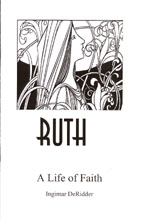
Ruth
A Life of Faith
1. Faithful Choices
2. Gracious Voices
3. Feet of Faith
4. Family of Faith
Faithful Choices
Careful, you might lose your sons in Moab. Hunger has a way of moving us. There are times when we find Jacob's children moving to Egypt. Careful, what begins with palaces may end in prisons. What may seem to be gains, may soon become chains. Be careful! There are times when even our Lord "must needs go through Samaria,"1 but Samaria must never go through us. We are to be in the world, but not of the world.
Our lives are designed by the choices we make. Our choices are the little chisels that chip away at what little time we have here, and what we are left with will be a monument and memorial called "our life." The result of our choices will testify for all eternity as to our conduct and character. Remember Lot. Lot seems to have paid too high a price for a little real estate in Sodom. It ended up costing him dearly. His wife was turned into stone, only two daughters were rescued, and they had more of Sodom in them than was seemly.
Elimelech took his family and his future to Moab. It seemed there were jobs in Moab, yes but were there churches? Some have allowed economic misfortune to drive them to a more catastrophic spiritual famine. As each hammer blow of the sculptor reveals what is hidden in the marble, and what is hidden in the heart of the artist, so each choice brings out and reveals our own character and what is within.
The story of Ruth takes place during the times of the Judges. It was a chaotic age when "every man did that which was right in their own eyes."2 From a human stand point, taking his family to Moab seemed right to Elimelech. However, as Solomon would later point out, "There is a way that seemeth right unto a man but the end thereof are the ways of death."3 At the end of this road there would be three early graves left in Moab as monuments and warnings to all that we might be careful in the choices we make. Elimelech little realized that he was about to make his wife a widow. While there was no "king" in Israel, every man is king of his own castle. He is also the Prime Minister and the Supreme Court justice. The head of household is responsible for an orderly government. In a home, as well as in a country, when everyone does that which is right in their own eyes the result is often chaos and catastrophy. And sometimes when a father does only that which is right in his own eyes, and cares little for God's rule and order, he is teaching his sons to do likewise. If we look to Moab for our livelihood, instead of to the Lord, our sons may end up marrying the daughters of Moab. That somehow God brought beauty from these ashes and made Ruth famous does not mean your story of recklessness will have a similarly happy ending.